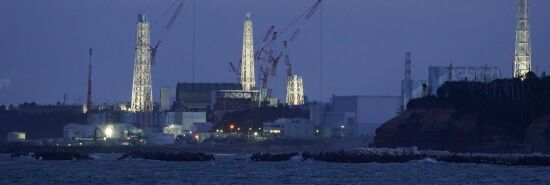
China’s stunning environmental hypocrisy over Fukushima water plan
Tom Rogan
Video Embed
In 2011, a massive earthquake struck Japan, causing cooling systems at the Fukushima nuclear plant to fail and a nuclear meltdown to occur. Since then, Japan has purified more than a million tons of contaminated water from the disaster site.
On Thursday, Japan began releasing that water into the Pacific Ocean. This process will continue for the next 30 years and has been approved by both Japanese and international regulators as safe. The International Atomic Energy Agency found that Japan’s plan is “consistent with relevant international safety standards … the controlled, gradual discharges of the treated water to the sea … would have a negligible radiological impact on people and the environment.” These findings have satisfied most international observers. Moreover, Japan has every incentive to ensure that it does not pollute its own coastal waters and their fishing stocks.
DOJ FILES LAWSUIT AGAINST SPACEX
One nation, however, is very unhappy with the Fukushima drainage plan: China. It has now banned importation of Japanese-sourced fish.
Speaking from the Chinese foreign ministry on Thursday, spokesman Wang Wenbin falsely claimed that Japan’s plan had received “strong criticism and opposition from the international community.” He added that “Japan has turned itself into a saboteur of the ecological system and polluter of the ocean.” Beijing’s Global Times propaganda newspaper added to the clamor, screeching that “China’s opposition to Japan’s nuclear wastewater dumping is for the common good of the international public.” It then offered the arrogant hope that “after Japan dumps the nuclear-contaminated water, the price of aquatic products from the Chinese mainland in the international market will rise relatively compared with other regions.”
Let’s be clear about three things. First, only a fool would trust the Chinese Communist Party’s environmental standards over those of democratic rule-of-law governed Japan. Second, China’s complaint about the Fukushima water plan is not motivated by environmental concerns but rather by Beijing’s sense it can use this issue to weaken its historic nemesis and America’s primary Pacific ally. Third, for China to complain about actions that damage the environment is the peak of hypocrisy.
It is China, after all, which is scouring the world’s oceans with its fishing fleet hordes. These fleets are decimating vulnerable fishing stocks and already impoverished local fishing industries in West Africa, the Pacific, and Latin America. China denies this, of course. Its fishing fleets turn off their location transponders so that they can intrude into other nations’ exclusive economic zones and/or plunder ecological reserves such as the Galapagos Islands.
This is just the tip of the iceberg when it comes to China’s ecological rampage.
China also feeds tens of millions of cubic tons of plastic from its rivers into the ocean each year. And Beijing has systematically dammed the Mekong River for its own selfish interests and at the expense of its southern neighbors.
CLICK HERE TO READ MORE FROM THE WASHINGTON EXAMINER
China is also far and away the world’s greatest carbon emissions polluter, releasing twice as much carbon into the atmosphere as the next biggest polluter, the U.S. Just as Beijing lies about its fishing fleets, it lies about its climate change policy. Xi Jinping might claim that climate change is a major priority, but he is constructing hundreds of new, dirty coal-power plants. Xi simply uses the phrase “climate change” as leverage via which to extract other concessions from the West.
Put simply, Japan’s Fukushima water plan can be trusted as environmentally sound. Considering its own environmental record, China’s complaints should be treated with nothing but disdain. Indeed, the world should consider the opposite of what Beijing says on environmental issues to be more likely the truth.
